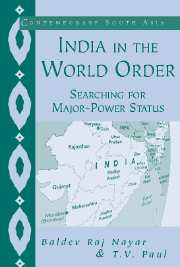Book contents
- Frontmatter
- Contents
- Acknowledgements
- 1 Introduction: India and Its Search for a Major-Power Role
- 2 Major-Power Status in the Modern World: India in Comparative Perspective
- 3 The Constraints on India: International and Domestic
- 4 Nehru's Grand Strategy for a Major-Power Role, 1947—1964
- 5 Strategy in Hard Times: The Long March for Capabilities, 1964—1990
- 6 After the Cold War: Adaptation, Persistence and Assertion, 1991—2001
- 7 Conclusions: India and the Emerging International Order
- Bibliography
- Index
2 - Major-Power Status in the Modern World: India in Comparative Perspective
Published online by Cambridge University Press: 05 July 2014
- Frontmatter
- Contents
- Acknowledgements
- 1 Introduction: India and Its Search for a Major-Power Role
- 2 Major-Power Status in the Modern World: India in Comparative Perspective
- 3 The Constraints on India: International and Domestic
- 4 Nehru's Grand Strategy for a Major-Power Role, 1947—1964
- 5 Strategy in Hard Times: The Long March for Capabilities, 1964—1990
- 6 After the Cold War: Adaptation, Persistence and Assertion, 1991—2001
- 7 Conclusions: India and the Emerging International Order
- Bibliography
- Index
Summary
A longstanding foreign-policy goal of India's elites has been to achieve major-power status for their country in the international system. Despite variations in the intensity of this ambition, in the application of the means to achieve it, and in the willingness to take hardline positions, this thread has been common in the policies of Prime Minister Jawaharlal Nehru and his successors, especially Indira Gandhi and Atal Bihari Vajpayee. Although Nehru often spoke against great-power politics, underneath his idealism lay a submerged realism about the potential of India to become a major power in the international system. Such a desire was evident in his pursuit of nonalignment, in his autarkic economic-development strategy, which placed heavy emphasis on the public sector and heavy industry, and in the prominence he gave to science and technology. The building up of the nuclear and space programs by Nehru and his successors has also been driven largely by the desire to become a major power.
Among India's political parties, the Bharatiya Janata Party (BJP) has been the most outspoken articulator of the goal of having India achieve a major-power position. Unlike the Congress leaders, the BJP top brass has not been ideologically constrained in proclaiming major-power status as an explicit part of its core policy objectives. One of the key reasons for the nuclear tests in 1998 by the BJP-led government was to achieve the party's longstanding objective of major-power status for India.
- Type
- Chapter
- Information
- India in the World OrderSearching for Major-Power Status, pp. 27 - 64Publisher: Cambridge University PressPrint publication year: 2002



